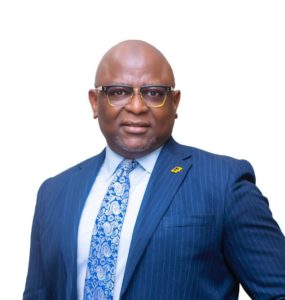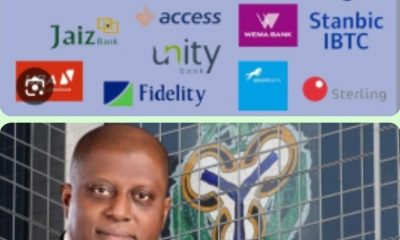Business
FirstBank Bounces Back to its Leadership Position, Delivers a Fantastic Performance in 2021

FirstBank Bounces Back to its Leadership Position, Delivers a Fantastic Performance in 2021
As financial market analysts continue to digest the 2021 financial results of the FirstBank Limited, which they say reflect the return of the banking conglomerate to its leadership position, Festus Akanbi writes that the regime of strong fundamentals which the robust performance represents is in tandem with the ongoing restructuring being midwifed by the current board and management of the company
The Nigerian investing community was held spellbound earlier in the week when FBN Holdings Plc released its much-awaited 2021 financial statements to the public, showing a stellar performance, especially in its banking subsidiary, First Bank of Nigeria Limited, which is said to be indicative of its strong recovery from its hitherto dwindling financial position.
Banking and capital market analysts, in their immediate reactions, said the impressive results signpost a regime of strong fundamentals after a period of restructuring by the leadership of its current management and board.
The Scorecard.
To mitigate the effect of the low-interest rate on investment securities and revenue generation, the bank was said to have intensified deposit mobilisation and funding strategy to support enhanced loan growth at optimised rates leading to a 5.7% increase in interest expense to N140.8 billion as against N133.2 billion in December 2020.
During the period, non-interest revenue grew by 96.1% to N364.6 billion as against N185.9 billion in the preceding year on the back of increased fees and commission income, treasury activities, and other operating income.
According to a report by Nairametrics, in its bid to further enhance its revenue generation capacity, First Pension Custodian Limited, a subsidiary of First Bank of Nigeria Limited, entered into a definitive agreement with Access Bank Plc for the planned acquisition of the entire share capital of Access Pension Fund Custodian Limited held by Access Bank Plc. This, according to the management of the bank will further boost its market share in the industry, aid revenue diversification, and support annuity income.
The bank says it will continue to create quality loans with a focus on retail lending driven by technology as it continues to grow non-interest income to further diversify revenue.
To show for the relentless efforts of the board and management of the bank, deposits from customers increased by 19.5% y-o-y to N5.9 trillion (Dec 2020: N4.9 trillion) reaffirming the bank’s strong market access and robust funding base.
A statement from the bank said, “Our investment in agent banking, digitalisation, and deployment of digital platforms which our customers have adopted, improved customer penetration and deepened our solid retail franchise. This continues to provide us with access to stable funding, reducing our cost of fund ratio to 2.1% (Dec 2020: 2.3%) while supporting the float of our current and savings account at 91.2% (First Bank of Nigeria).”
In the same vein, total assets grew 16.2% y-o-y to N8.9trillion as against N7.7trillion in 2020, driven by a 30.0% y-o-y increase in customer loans and 26.3% increase y-o-y in investment securities. Cash and balances with Central Banks, loans to banks & customers, and investment securities constitute 87.2% of total assets (Dec 2020: 83.4%).
“With a cleaner balance sheet and resilient earnings-generating capacity, FirstBank (Nigeria) was able to accrete capital buffers from organic earnings. Hence, despite the increase in loans and advances, Capital Adequacy Ratio (CAR) remained steady, marginally increasing to 17.4% (Dec 2020: 17.0%),” the report said.
Meanwhile, the audited report for the group indicated an impressive double-digit growth in the top line and the bottom line. Gross earnings rose from N590.66 billion in 2020 to N757.30 billion in 2021. Profit before tax doubled by 99.1 per cent to N166.66 billion in 2021 as against N83.7 billion in 2020. Profit after tax grew by 68.4 per cent from N75.6 billion to N151.079 billion. Earnings per share thus increased from N2.45 in 2021 to N4.17 in 2021.
Its balance sheet also gives cause for joy to its stakeholders as its total assets rose from N7.69 trillion in 2020 to N8.93 trillion in 2021. Customers’ deposits grew to N5.85 trillion in 2021 as against N4.9 trillion in 2020. Loans and advances to customers also improved from N2.21 trillion to N2.88 trillion. With total liabilities rising from N6.92 trillion to N8.05 trillion, shareholders’ funds increased from N765.17 billion in 2020 to N879.86 billion in 2021.
A quick analysis of the performance shows a progressive trajectory that has portrayed First Bank as an organisation that has recovered from past episodic challenges that led to a change of baton at its board level.
Analysts are quick to point at the recent restructuring exercise in the organisation as the launchpad for the excellent balance sheet operations which translated into a 30.3 per cent rise in its gross earnings, while total assets and customer deposits rose by 15.9 per cent and 19.5 per cent respectively.
The audited report also confirmed Mr. Femi Otedola as the largest individual shareholder of the group, with total direct and indirect shareholdings of 7.57 per cent.
Fall in NPLs, Boost to Profitability
For a bank that was almost brought to its knees by the burden of non-performing loans, it came as a great relief to both the shareholders and the regulatory authorities that for the first time in a long while, First Bank’s NPLs came down to 6.1 per cent, significant progress for the bank when compared to other Tier 1 banks and the regulatory threshold of 5.0per cent.
Analysts also attributed the significant fall in the NPL rates from 40 in 2016 to 6.5 per cent in 2021, to a new culture of corporate governance currently in place in the group and which has successfully revamped the company’s risk management capabilities.
According to the bank, the recent turnaround and improvement in the non-performing loans have been a major boost in FirstBank’s quest to improve profitability and reinforce its leadership in the financial services industry in Nigeria.
Analysts said with the impressive results for its 2021 operations, the board and management of FBN have proven to the investing community that the company is ready to take its leadership role in the nation’s banking sector and that the years of locusts have been put behind the institution.
A Transition to Sustained Growth
In their view, First Bank, with these impressive results has demonstrated the fact that is transitioning into a sustained growth phase and delivering performance commensurate with the size of its business capabilities of its people.
And for the shareholders of the company, it was a harvest time with N12.56 billion set aside as divided, about 8.3 percent of the total net earnings recorded in 2021.
A capital market analyst, Mr. David Edobor explained that the major transformation in First Bank, as evident in its mouth-watering performance should be attributed to the doggedness and determination of the new leadership of the bank. His view was corroborated by a source from the company who explained that the performance was driven by a relentless focus on the needs of customers and improving the competitiveness of the bank’s offerings.
“We have sharpened our “Go to Market” approach to better leverage the opportunities which our large scale provides, in addition to becoming more relevant to our clients by improving our value propositions.”
Over the years, FirstBank has been able to grow customer accounts from about 10 million in 2015 to over 36 million (including digital wallets). It also became the second-largest issuer of cards in Africa with over 11.8million issued cards, onboard over 18.6 million active customers on First Bank digital banking platforms.
New Hands, New Culture of Excellence
Market watchers said although some of the impressive figures represented the performance of the bank before the coming of the current leadership, analysts said the good news coming from the organisation will greatly challenge the incumbent board and management to push the frontier of excellent performance in the company.
It would be recalled that the bank was able to stabilise after a leadership tussle at the board level. However, with the triumph of Adeduntan and his return to his post, the foremost bank has been recording stellar performances.
Part of the changes was the emergence of the chairman of Geregu Power Plc, Femi Otedola as the highest single shareholder of the company.
An elated Chief Executive Officer of First Bank, the banking arm of the holding company, Dr. Adesola Adeduntan, described the success of the commercial banking business as the beginning of the transition into a sustained growth phase.
He said, “Following years of strategic restructuring of the Bank’s balance sheet and operations, the Commercial Banking business is beginning to transition into a sustained growth phase delivering performance commensurate to the size of our business and capabilities of our people. Profit before tax is up 77.9%, gross earnings 30.3%, total assets 15.9%, and customer deposits up 19.5%.”
This performance, according to him, was driven by a relentless focus on the needs of customers and improving the competitiveness of the bank’s offerings. “We have sharpened our ‘Go To Market’ approach to better leverage the opportunities which our large scale provides in addition to becoming more relevant to our clients by improving our value propositions.
“This performance is also in line with the Bank’s Quantum Profitability Leap agenda which seeks to ensure that we fully maximise the revenue-generating capacity of our business to boost the bottom line and fulfil the expectations of all stakeholders in the business,” Adeduntan stated.
FirstBank engages in the business of commercial banking and has many subsidiaries that focus on international commercial banking, trusteeship, capital markets, pension fund custodianship, mortgage financing, insurance brokerage, and management of SMIEIS fund investments, small-scale banking, and bureau de change activities.
Culled from ThisDay
Bank
Alpha Morgan to Host 19th Economic Review Webinar

Alpha Morgan to Host 19th Economic Review Webinar
In an economy shaped by constant shifts, the edge often belongs to those with the right information.
On Wednesday, February 25, 2026, Alpha Morgan Bank will host the 19th edition of its Economic Review Webinar, a high-level thought leadership session designed to equip businesses, investors, and individuals with timely financial and economic insight.
The session, which will hold live on Zoom at 10:00am WAT and will feature economist Bismarck Rewane, who will examine the key signals influencing Nigeria’s economic direction in 2026, including policy trends, market movements, and global developments shaping the local landscape.
With a consistent track record of delivering clarity in uncertain times, the Alpha Morgan Economic Review continues to provide practical context for decision-making in a dynamic environment.
Registration for the 19th Alpha Morgan Economic Review is free and can be completed via https://bit.ly/registeramerseries19
It is a bi-monthly platform that is open to the public and is held virtually.
Visit www.alphamorganbank to know more.
Business
GTBank Launches Quick Airtime Loan at 2.95%

GTBank Launches Quick Airtime Loan at 2.95%
Guaranty Trust Bank Ltd (GTBank), the flagship banking franchise of GTCO Plc, Africa’s leading financial services group, today announced the launch of Quick Airtime Loan, an innovative digital solution that gives customers instant access to airtime when they run out of call credit and have limited funds in their bank accounts, ensuring customers can stay connected when it matters most.
In today’s always-on world, running out of airtime is more than a minor inconvenience. It can mean missed opportunities, disrupted plans, and lost connections, often at the very moment when funds are tight, and options are limited. Quick Airtime Loan was created to solve this problem, offering customers instant access to airtime on credit, directly from their bank. With Quick Airtime Loan, eligible GTBank customers can access from ₦100 and up to ₦10,000 by dialing *737*90#. Available across all major mobile networks in Nigeria, the service will soon expand to include data loans, further strengthening its proposition as a reliable on-demand platform.
For years, the airtime credit market has been dominated by Telcos, where charges for this service are at 15%. GTBank is now changing the narrative by offering a customer-centric, bank-led digital alternative priced at 2.95%. Built on transparency, convenience and affordability, Quick Airtime Loan has the potential to broaden access to airtime, deliver meaningful cost savings for millions of Nigerians, and redefine how financial services show up in everyday life, not just in banking moments.
Commenting on the product launch, Miriam Olusanya, Managing Director of Guaranty Trust Bank Ltd, said: “Quick Airtime Loan reflects GTBank’s continued focus on delivering digital solutions that are relevant, accessible, and built around real customer needs. The solution underscores the power of a connected financial ecosystem, combining GTBank’s digital reach and lending expertise with the capabilities of HabariPay to deliver a smooth, end-to-end experience. By leveraging unique strengths across the Group, we are able to accelerate innovation, strengthen execution, and deliver a more integrated customer experience across all our service channels.”
Importantly, Quick Airtime Loan highlights GTCO’s evolution as a fully diversified financial services group. Leveraging HabariPay’s Squad, the solution reinforces the Group’s ecosystem proposition by bringing together banking, payment technology, and digital channels to deliver intuitive, one-stop experiences for customers.
With this new product launch, Guaranty Trust Bank is extending its legacy of pioneering digital-first solutions that have redefined customer access to financial services across the industry, building on the proven strength of its widely adopted QuickCredit offering and the convenience of the Bank’s iconic *737# USSD Banking platform.
About Guaranty Trust Bank
Guaranty Trust Bank (GTBank) is the flagship banking franchise of GTCO Plc, a leading financial services group with a strong presence across Africa and the United Kingdom. The Bank is widely recognized for its leadership in digital banking, customer experience, and innovative financial solutions that deliver value to individuals, businesses, and communities.
About HabariPay
HabariPay is the payments fintech subsidiary of GTCO Plc, focused on enabling fast, secure, and accessible digital payments for individuals and businesses. By integrating payments and digital technology, HabariPay supports innovative services that make everyday financial interactions simpler and more seamless.
Enquiries:
GTCO
Group Corporate Communication
[email protected]
+234-1-2715227
www.gtcoplc.com
Business
BUA Group, AD Ports Group and MAIR Group Launch Strategic Plan for World-Class Sugar and Agro-Logistics Hub at Khalifa Port

BUA Group, AD Ports Group and MAIR Group Sign MoU to Explore Collaboration in Sugar Refining, Agro-Industrial Development, and Integrated Global Logistics Solutions
Abu Dhabi, UAE – Monday, 16th February 2026
BUA Group, AD Ports Group, and MAIR Group of Abu Dhabi today signed a strategic Memorandum of Understanding (MoU) to explore collaboration in sugar refining, agro-industrial development, and integrated global logistics solutions. The partnership aims to create a world-class platform that strengthens regional food security, supports industrial diversification, and reinforces Abu Dhabi’s position as a hub for trade and manufacturing.
The proposed collaboration will leverage BUA Group’s industrial and logistics expertise, Khalifa Port’s world-class infrastructure, and AD Ports Group’s operational experience. The initiative aligns with the objectives of the UAE Food Security Strategy 2051, which seeks to position the UAE as a global leader in sustainable food production and resilient supply chains. It also aligns with Nigeria’s food production- and export-oriented agricultural transformation agenda, focused on scaling domestic capacity, strengthening value addition, improving post-harvest logistics, and unlocking new markets for Nigerian produce across the Middle East, Asia, and beyond.

Photo Caption: L-R: Kabiru Rabiu, Group Executive Director, BUA Group; Cpt. Mohammed J. Al Shamisi, MD/Group CEO, AD Ports Group; Saif Al Mazrouei, CEO (Ports Cluster) AD Ports Group; Abdul Samad Rabiu, Founder/Executive Chairman, BUA Group; and Steve Green, Group CFO, MAIR Group
Through structured aggregation, processing, storage, and maritime export channels, the partnership is designed to reduce supply chain inefficiencies, enhance traceability and quality standards, and also create a predictable trade corridor between West Africa and the Gulf.
BUA Group—recognised as one of Africa’s largest and most diversified conglomerates, with major investments across sugar refining, food production, flour milling, cement manufacturing, and infrastructure- brings extensive industrial expertise and large-scale operational capability to the venture. MAIR Group will provide strategic support in developing integrated logistics and agro-industrial solutions, creating a seamless platform for production, storage, and distribution.
Abdul Samad Rabiu, Founder and Chairman of BUA Group, said:
“This MoU marks an important milestone in BUA’s international expansion and reflects our long-term vision of building globally competitive industrial platforms. Together with AD Ports Group and MAIR Group, we aim to develop sustainable food production and logistics solutions that strengthen regional supply chains and support the UAE’s Food Security Strategy 2051.”
He further added that, “This partnership represents not just a commercial arrangement but a strategic food corridor anchored on shared economic ambition, resilient infrastructure, and disciplined execution, reinforcing long-term food security objectives for both nations.”
A representative of MAIR Group added:
“This collaboration underscores our commitment to advancing strategic industries in Abu Dhabi and building integrated solutions that reinforce the UAE’s position as a global hub for trade, food security, and industrial excellence.”
A spokesperson from AD Ports Group commented:
“Our partnership with BUA Group and MAIR Group highlights Khalifa Port’s role as a catalyst for high-impact industrial investments. This initiative will enhance regional food security, strengthen global trade connectivity, and support Abu Dhabi’s economic diversification goals.”
This MoU marks a historic collaboration that combines world-class infrastructure, industrial expertise, and strategic vision, setting the stage for a sustainable and resilient food and logistics ecosystem that will benefit the UAE, the region, and global markets alike.
-

 celebrity radar - gossips6 months ago
celebrity radar - gossips6 months agoWhy Babangida’s Hilltop Home Became Nigeria’s Political “Mecca”
-

 society6 months ago
society6 months agoPower is a Loan, Not a Possession: The Sacred Duty of Planting People
-

 society5 months ago
society5 months agoReligion: Africa’s Oldest Weapon of Enslavement and the Forgotten Truth
-

 news6 months ago
news6 months agoTHE APPOINTMENT OF WASIU AYINDE BY THE FEDERAL GOVERNMENT AS AN AMBASSADOR SOUNDS EMBARRASSING









